The High Court has sentenced the three men who murdered two brothers, one of them a police officer, in May 2017, to prison sentences ranging from 34 years to life imprisonment.
The sentences show how a person sentenced to life could, in theory, spend less time behind bars than a prisoner on whom the court imposes a determinate sentence.
Earlier today (Wednesday), Justice Brian Cottle, sitting at High Court No. 1, in Kingstown, sentenced Schemel “Jacket” Dunbar, 35 and Kendine “Hoodie” Douglas, 36, both of Rillan Hill to life imprisonment and Richard “Carib” Francis, 38, of Layou, to 33 years and nine months in prison.
However, Dunbar and Douglas would be eligible for parole after 30 years, while no such review was ordered for Francis, who was the mastermind of the killings.
Dunbar and Douglas were on June 9, 2023 found guilty of the May 4, 2017 murder of Danroy Cozier, a 26-year-old police constable, and Nicholas Cozier, his 19-year-old brother.
Francis pleaded guilty to the charges at a trial that began in November 2022 and the judge discharged the jury and ordered a new trial of his co-accused before a fresh jury.
In summarising the facts of the case, Justice Cottle said that on April 26, 2017, Constable Cozier was driving to his home at Mesopotamia with his wife and their infant child as passengers, when a minivan, driven by Francis, an ex-constable, collided with Cozier’s vehicle.
The two discussed the incident and Francis accepted responsibility and undertook to pay Cozier.
The officer waited for a few days but Francis did not fulfil his promise, having decided it was more economical to hire someone to murder Cozier.
Dunbar agreed to commit the crime and engaged Douglas as his assistant.
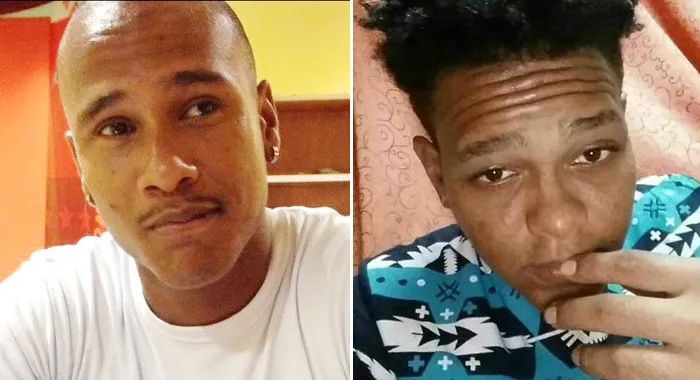
The judge said that on May 4, 2017, Francis telephoned Cozier and invited him to meet to collect the money.
Cozier was at his mother’s home and took his younger brother along with him.
CCTV footage showed Francis stopping at Sion Hill and having a conversation with Cozier then he and the brothers entered Francis’ van, which left the area.
Dunbar was concealed somewhere in the rear of the van and suddenly appeared as they were driving along.
He shot both Coziers and post mortem examinations revealed that they were each shot both in the head.
They drove to Sion Hill but changed their minds about dumping the bodies in an area where some construction workers were working.
The men took the bodies to Sion Hill Bay and dumped them onto the beach.
Some local fishermen found the bodies shortly after and contacted the police.
The officers contacted Cozier’s family and learnt that he was supposed to meet with Francis.
Wet, bloody clothes and van
Dunbar and Douglas were arrested in Rillan Hill later that same day. Douglas had with him a bag of clothes that appeared to be wet and bloody.
Francis was arrested at his home and the inside of his van showed traces of blood and was wet.
Francis and Douglas admitted to participating in the killings but denied firing any of the fatal shots.
Douglas took police and showed where the brothers were picked up, where they were shot, where the bodies were disposed of and where he and Francis had tried to clean the van.
Items retrieved from the trio, including Dunbar’s cellphone, were forensically analysed in Jamaica and found to contain the DNA of the deceased men.
Analyses of the defendant’s phone records show that there were many calls between Dunbar and Francis between the day of the accident and the killings.
There were also many calls between Dunbar and Douglas during that period.
Justice Cottle said that the phone records were important because Dunbar said he and Francis were not friends and were not in communication.
Further, an anonymous witness testified that Dunbar had told him in prison that he had murdered both men and that Nicholas Cozier had been an unexpected victim.
The judge said that there was no evidence that Dunbar was the mastermind of the killing.
Douglas regrets entering van
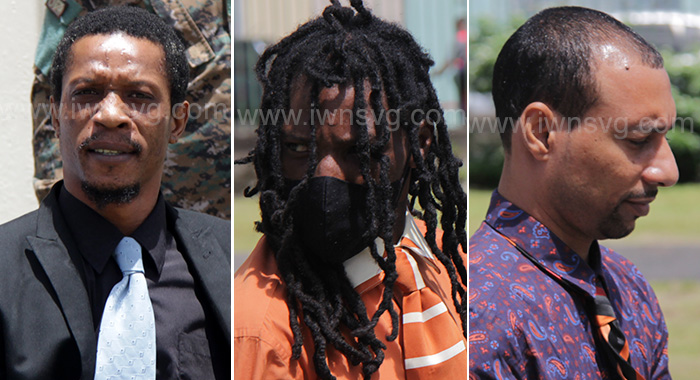
A social inquiry report revealed that members of Douglas’ community described him as helpful, reliable and respectful and were shocked at his conviction.
The reports showed that he ended his education at the primary school level but was a skilled worker with hands and worked in the construction industry.
Douglas enjoyed hunting and spent a lot of time doing that. He was the only male and main breadwinner in his home, the judge said.
Douglas told the social worker that he took responsibility for the parts he played in the crime but insisted that he was not part of the planning.
He said he regretted getting into the vehicle and asked the families of victims for forgiveness.
Justice Cottle noted that Douglas’ lawyer, Grant Connell, had said he was not a threat to society and was a good candidate for rehabilitation.
The lawyer further noted that Douglas cooperated with police and exhibited good behaviour in prison.
The lawyer emphasised that Douglas was neither the planner nor executioner of the crime.
‘peaceful’ and ‘well liked’
Meanwhile, a social inquiry report showed that Francis graduated secondary school with six subjects and is the father of five children by five different women.
Members of his community described him as peaceful and well liked and were surprised that he was involved in crime, far more murder.
Prison authorities said he is an exemplary prisoner who actively participates in the rehabilitation programmes.
Not the ‘worst of the worst’ murders
The judge pointed out the aims of criminal sentencing, namely retribution, deterrence, prevention and rehabilitation.
He further outlined the sentencing guidelines for murder and noted that the court is expected to follow them unless doing so would lead to injustice.
The judge said he saw no reason to depart from the guidelines in the extant case.
He noted that the court can impose a death sentence, whole life sentence or determinate sentence for murder, and in cases where the convicted person is mentally ill, can detain the person at the court’s pleasure.
Justice Cottle said the prosecution did not seek the death penalty and he commented that the case did not rise to the Privy Council’s standard of killings for which the death penalty should be imposed.
“Despite the senseless killing of a police constable and his younger brother over a minor debt, the case does not rise to the level where the Privy Council considers it to be the worst of the worst,” Justice Cottle remarked.
The judge noted that one of the victims was a police officer and the killers knew this before the murder.
He further pointed out that it was a contract killing as Francis considered it more economical to pay for the killing than the repair of Cozier’s vehicle.
“It was the murder of two people,” the judge further stated, noting that the court agreed with the prosecution that the crimes were exceptionally serious.
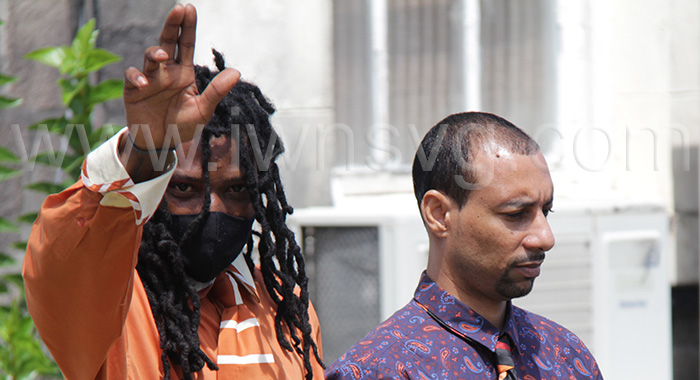
Douglas chose to participate in the ‘scene’
The judge pointed out that Douglas’ lawyer had asked for a determinate sentence, noting his client’s assistance to the police and arguing that Douglas was akin to an accessory after the fact.
The court disagreed, saying that Douglas was always aware of the plan and chose to participate in the “scene”, as he described it, even as he played a lesser role.
The court, therefore, elected a starting point of a whole life sentence for Douglas.
The judge said that Francis’ case was slightly different, having pleaded guilty late in his trial.
Justice Cottle said Francis should have been starting at life imprisonment, but because of his guilty plea the court could not a life sentence. The court, therefore, adopted a starting point of 40 years, the middle point of the range.
no provocation
As regards the death of the older brother, the court held that there was a significant degree of planning and remediation in that Francis and Dunbar agreed to the murder and Dunbar enlisted Douglas.
Further aggravating of the killing was the fact that there was no provocation and the constable was killed along a public road and his body dumped on a public beach.
Similarly, there was no provocation for murder of Nicholas, who was also killed along a public road and his body dumped on a public beach.
The judge pointed out that Douglas and Francis had assisted the police while Dunbar did not.
Dunbar beat murder charges twice
Aggravating of the offenders, the judge noted that Dunbar was previously charged with murder twice, though he was not convicted, but had convictions for unlicensed firearm and ammunition, assault occasioning actual bodily harm, and malicious wounding for which he has served time.
Douglas has no relevant previous conviction and Francis had nothing aggravating of him.
Dunbar had no mitigating factor while Douglas and Francis’ previously good character as well as their prospects for rehabilitation and their good behaviour in prison mitigated on their behalf.
The court concluded that the aggravating features outweighed the mitigating and would have increased Douglas and Dunbar’s sentences if it were possible.
In the case of Francis, his good character and lack of criminal antecedent were powerful mitigating features, the judge held.
He, however, said that when the court weighs these against the senseless murder, it would not adjust his sentence because he chose to contract the murder of a young police officer and countenance the murder of the officer’s younger brother.
The judge further noted that Francis’ guilty plea came very late in his trial, adding that the sentencing guidelines say that there should be no adjustments to a sentence that had been reduced from a whole life sentence.
The judge noted that the three men had spent six year and three months in prison, leaving Francis to serve a further 33 years and nine months for the murder of the officer and a similar sentence for the murder of his younger brother.
The judge said that both killings were part of the same transaction and, therefore, ordered that the sentences run concurrently, beginning today.
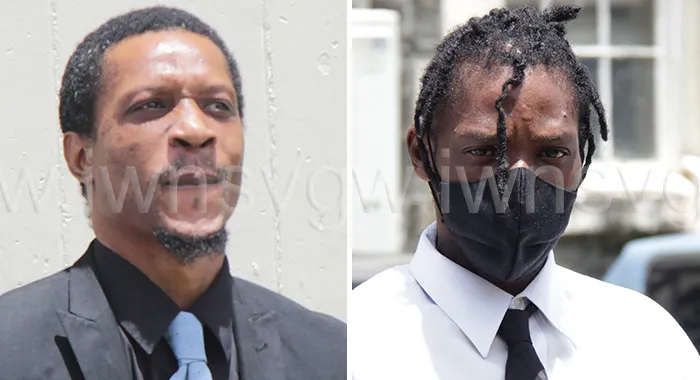
‘the upholder is worse than the thief
In the case of Dunbar and Douglas, they were both sentenced to spend the rest of their natural life in prison for the murder of the officer and the same sentence would apply for the death of the younger Cozier, with the sentences running concurrently.
In handing down on Douglas the same sentence as he did on Dunbar, the judge said that in St. Vincent and the Grenadines, it is popularly said that the upholder is worse than the thief.
He, however, said he chose not to distinguish between Dunbar and Douglas as they had acted as a team and would share the same fate.
The judge noted that there is no parole act in SVG, adding that it would, therefore, appear that Dunbar and Douglas’ whole life sentences means that the men would literally spend all their life behind bars.
Justice Cottle said he thinks this is wrong as convicted people should remain human and the court should be able to reduce such a sentence after a period of time.
He said he had not received any guidance from the Court of Appeal on this matter.
The judge, therefore, ordered that after serving 30 years, Dunbar and Douglas would be brought up before the court to assess whether they have been rehabilitated so they can return to society.
If not, they will be rehabilitated every three years thereafter.
‘no torture, prolonged trauma or humiliation’
Before handing down his sentence, Justice Cottle had heard further submission from Connell, Karl Williams, who represented Dunbar and Ronald “Ronnie” Marks, who represented Douglas.
In mitigation, Williams reasoned that even if there was a plan or premeditation and although the manner of killing was gruesome and violent, there was no torture, prolonged trauma or humiliation of the Cozier brothers before death.
He said that considering the reasoning of the Privy Council in the case of Daniel Dick/Trimmingham aka Compay, the murders of the Cozier brothers could not be considered “the worst of the worst or the rarest of the rare”.
The lawyer said there was no evidence that Dunbar received any sort of money in relation to the killings and no evidence that he was the mastermind of the crimes.
He said that although the seriousness of the offence is reflected in the penalties prescribed, a competent court would consider the seriousness as gleaned from Dunbar’s degree of criminal culpability and the degree of harm caused.
Williams said that even though the court might have been contemplating a whole life sentence “or the ultimate”, his submissions begs the court to arrive at a determinate sentence that serves the permissible aims of punishment.
The lawyer said it is not impossible for Dunbar to be rehabilitated.
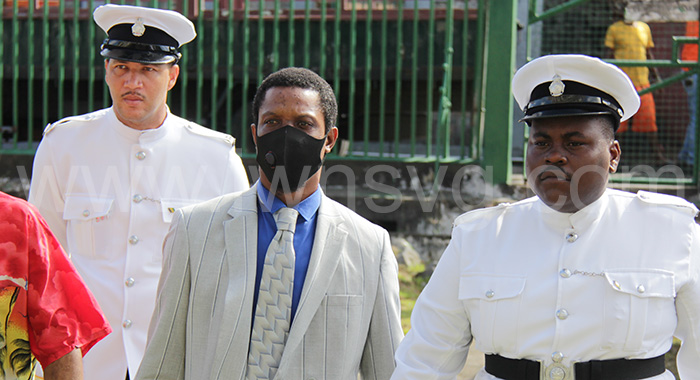
‘neither the planner nor executioner’
Meanwhile, Connel emphasised Douglas’ role “in this very unfortunate incident”.
The lawyer said his client “was neither the planner nor executioner.
“From the very beginning, he assisted the authorities to an extent where he gave meticulous details on which the police grounded their case,” Connel said.
He said that the social inquiry report shows that Douglas is not a threat to the society and is a good prospect for rehabilitation.
The lawyer submitted that once the four pillars of sentencing are addressed and applied, Douglas should not receive the maximum sentence applicable in the case.
‘How did this man end up here?’
Marks emphasised that Francis was the only person who pleaded guilty, albeit at a late stage when the trial had already started.
He said the guilty plea was based on a statement Francis had given to the police, adding that those should be the facts upon which the court should base its sentence.
Marks said that the social inquiry report would cause “any reasonable human being to ask ‘How did this man end up here?'”
He said Francis is the first child of his parents, his father an ex-Coast Guard officer, diver and boat owner and his mother an entrepreneur.
The lawyer said that Francis is from a respected family “in Layou and generally”.
Marks said that in his interview with police, Francis immediately cooperated and provided all the information he had in relation to the matter.
This, Marks said, must be reflected in the sentence, adding that the prosecution, in its submissions, agreed in that respect.
The lawyer said Francis gave the story of the accident that was the genesis of the interaction with the older of the deceased brothers.
“He got into an accident, agreed to repair the vehicle, but describes his interaction with Dunbar where he met him and saw the accident and expressed to Francis that he had differences with the officer,” Marks said.
‘the persistence of Dunbar’
He said Francis detailed “the persistence of Dunbar” and described that on the day in question, he did not plan for the murder to happen.
“On leaving his home, Dunbar and Douglas stopped the van and basically had Francis acting under duress throughout this entire mission,” Marks said, and the two other defence counsel knitted their brows quizzically.
“That is what he said in his police interview;those are the facts that are reported to the court,” Marks further stated.
The lawyer said that from all the evidence, Francis did not “even hold a firearm and he certainly did not kill either of these two gentlemen”.
Marks said that in his interview, Francis told police that he was under fear and it was never his intention to have the gentlemen killed”.
The lawyer said: “But because of his involvement that was evidenced before the court, he clearly ticks all the requisite ingredients to murder and duress is not a defence to murder”.
The lawyer said the prosecution went through the steps in relation to the sentencing guidelines.
He said that because of the guilty plea and the duress, the starting point should be 30, rather than 40 years, as the prosecution had suggested and that Francis’ sentence should be subject to all the requisite additions and subtractions.

‘one other good boy here before you’
The lawyer said that with Francis’ reputation and previously good character, he has been assessed, quite rightly, as having good prospects of rehabilitation.
“We cannot trivialise the seriousness of this offence. Two good and decent lives have been snuffed out and families affected but there is one other good boy here before you,” Marks said.
He said “other than having five children with five different women, he (Francis) has not harmed anyone else and is a helpful member of the society and a treasured son”.
Marks said that Francis’ father described him as “‘an almost perfect son, but for his womanising’.
“We ask that the sentence you impose on Richard Francis reflect his role in accordance with the facts as laid out in his electronic interview with the police,” Marks told the court.




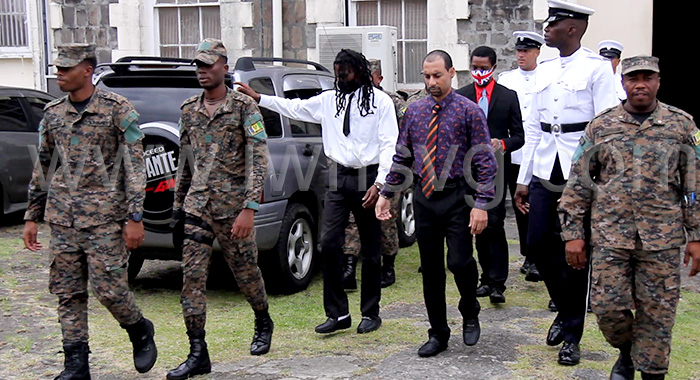


Cuz (Richard)
All my words as your Best friend & on the Job as your Supervisor and at my home where you would come and chill and we would have so many talks about life just have me here so sad and disappointed but I must also add no love lost for you you’re my blood and I’ll forever remember our times
My daughter who most from the school she attended in Svg thought she held so many secrets for you now cuz she’s grieving as I write
We’re so far away overseas and wish we could have been there to support you but one day we’ll visit and for sure visit you
We love you Richie Rich
Stephano 😭😭😭
To the Coziers
I myself is a former Cop there in SVG but was before Cozier’s time but knew him because he was my Wife’s Course Brother as they trained together at the RSVGPF TRAINING SCHOOL
She always spoke so highly of him for his so cool character and his Christian like principles
My wife took his passing hard and couldn’t even go to work ,she was especially hurt that she couldn’t come home to SVG to attend his funeral
We are so very sorry for your lost and pray that you’ll find comfort in knowing your son was such an amazing being .
Stephano
May both the Cozier brothers RIEP, although the law is the law all three of dem should have been sentenced to a public hanging. A family has lost two sons for what ?? A little change stupidness, they say don’t take the law into your own hands but I’m sorry All three dem man should dead eye for an eye clear cut , why dem have easy life in prison ??? Dat to good fe dem simplessss.
This is so stupid. They all committed a premeditated murder, a conspiracy, yet the mastermind only gets 34yrs and the other two murderers gets life? What a farce of a justice system in SVG
It is written, in the last days, man heart will be evil and desperately wicked.
Ah way dem dress up so fa ? dem going church ?
The law must not only be done but must be seen to be done according to Regina v Sussex, the penalty must must also it the crime and it did. When the perpetrator finished served his sentence he would be an old man if life so last. The penalty will serve as a deterrent to prevent this lawlessness as what is happening in SVG, once a peaceful place but now taken over by criminals and vagabonds and miscreants that make the life of citizens a mayhem. My only hope is that while you serve your sentence you will reflect on what is life true purpose and will act as a catalyst of change. Surely, its never too late.